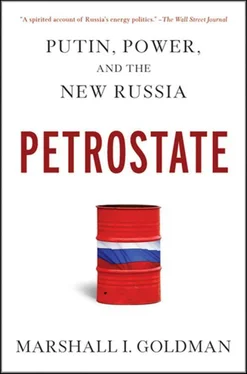39. Moscow Times , March 3, 2005; March 4, 2005.
40. Moscow Times , March 3, 2005.
41. Moscow Times , March 4, 2005.
42. Moscow Times , March 4, 2005.
43. Olga Kryshtanovskaia and Stephen White, “Putin’s Militocracy,” Post-Soviet Affairs 19, no. 4 (2003), 294.
44. Kommersant , November 30, 2007.
45. New York Times , December 12, 2007, C10.
46. Kremlin.ru, September 9, 2006, Transcript of meeting with participants in the third meeting of the Valdai Hills Discussion Club; Putin referred to Andrei Shleifer and Jonathan Hay.
47. V. Kleiner, “Korporativenoe upravlenie i effek”tivnost deliatel’nost kompani,” Voprosy ekonomikii , no. 3 (2006), 98.
48. Michael D. Cohen, “Russia and the European Union: An Outlook for Collaboration and Competition in European Natural Gas Markets,” Demokratizatsiya , 15, no. 4 (Fall 2007), 381.
49. Vremya novosti , August 31, 2007, 7; Moscow Times , October 4, 2007.
50. Novaya Gazeta , January 18, 2007, 2; Noviye Izvestiai, February 1, 2007, 5.
51. Financial Times , December 1, 2006, 4; Rossiiskaia Gazeta , October 3, 2005.
52. Chicago Tribune , September 27, 2006, 17.
53. Financial Times , December 12, 2007, 9.
54. Wall Street Journal Asia , November 9, 2007, 11.
55. Izvestia , November 27, 2007.
56. Businessweek.com , March 6, 2007; David Johnson’s Russia List 55, no. 33 (March 7, 2007).
57. Financial Times , February 4, 2006, 6.
58. Other purchases include Severstall’s acquisition of Rouge Industries in Dearborn, Michigan, and Lucchine Steel in Italy. Other recent purchases or green field construction include the Magnitigorsk Iron and Steel company’s decision to build a cold rolled steel mill in Ohio; the EVRAZ purchase of Oregon Steel, Highveld Steel, and Vanadium; Norilsk Nickel’s purchase of the Stillwater Mining Co. in Montana; the LionOre Canadian nickel mining company as well as the OM Mining Company; and Gazprom’s purchase of the British gas marketing company, Pennine Natural Gas along with its affiliate, Natural Gas Shipping Services and what someday is expected to be the purchase of the much larger Centrica, which in turn owns British Gas. Wall Street Journal, July 17, 2007, A2; Financial Times, July 19, 2007, 1; Moscow Times, July 17, 2007; New York Times, September 6, 2007, C4.
59. Financial Times, September 21, 2007, 10; Eurasia Daily Monitor , Jamestown Foundation 4, no. 189 (October 12, 2007).
60. Financial Times , September 20, 1997, 4.
61. Financial Times , November 22, 2006, 2.
62. China Daily, September 17, 2007, 6; Financial Times, September 21, 2007, 3.
63. Kremlin.ru , February 10, 2007; New York Times , February 11, 2007, 4.
Glossary of People and Companies
People
Jack AbramoffA lobbyist in Washington who worked with Texas Congressman Tom DeLay and ended up in prison. One of their clients was a Russian energy company.
Roman AbramovichA former partner of Boris Berezovsky, Abramovich ended up as the main owner of Sibneft, which he sold to the state, making him the richest man in Russia. He used some of the funds to buy the Chelsea soccer team in London.
Vagit AlekperovA former minister of the petroleum industry in the Soviet Union who set aside valuable oil properties for himself and created LUKoil. He is the largest individual stockholder. LUKoil sold 20 percent of its stock to ConocoPhillips.
Svetlana BakhminaA junior lawyer working for Yukos, she was arrested in the early morning hours and held hostage in an effort to force her boss to return to Russia for questioning after he fled to London.
Stanislav BelkovskyAn analyst who works closely with Kremlin officials and who often has leaked information which signaled measures that were about to be taken by the Kremlin.
Boris BerezovskyOne of the original oligarchs who became very close to members of Yeltsin’s family. Among other assets he controlled were Sibneft and Aeroflot as well as ORT, the main state-owned TV network. Early on, he befriended Putin and helped him rise to power. However after being criticized on ORT, Putin turned on him, and Berezovsky fled to London where he lives in exile.
Leonard BlavatnikA Russian émigré with an MBA from the Harvard Business School. He is the principle owner of Access Industries, a U.S. company, which is a major stockholder in Tyumen Oil and SUAL, Russia’s second largest aluminum company.
Sergei BogdanchikovThe CEO of Rosneft, the state-dominated oil company that took over ownership of the most valuable properties from Yukos.
Vladimir BogdanovA veteran oil official who became CEO of Surgutneftegaz when it became privatized.
William BrowderThe grandson of Earl Browder, the head of the U.S. Communist Party. He established the Hermitage Capital Management Fund, which became a major investor in Gazprom and other Russian companies. After he criticized Russian corporate business practices, he was denied a Russian visa and prevented from returning to Russia.
Lord John BrowneThe CEO of British Petroleum (BP) who created a 50/50 partnership with Tyumen Oil.
Aleksandr BulbovA lieutenant general in the Federal Narcotics Control Service who despite his rank was arrested by the FSB in what was thought to be a fight between government agencies over control of state assets.
Vladimir ButovThe governor of the Nenets Autonomous District, an area rich in oil deposits, who has been charged with extortion and questionable practices by oil companies seeking to operate in the region.
William CaseyThe director of the CIA under President Ronald Reagan who is said to have worked with Saudi Arabia to increase oil production in an effort to precipitate a drop in oil prices and hurt the USSR’s export earning capacity in order to bring about the collapse of the communist state.
Viktor ChernomyrdinThe former minister of the gas industry who transformed the ministry into the joint stock company Gazprom. He later became a prime minister of Russia. Yeltsin later fired him and made him chairman of Gazprom.
Oleg DeripaskaAn oligarch who became a favorite of Putin, Deripaska won control of Rusal, the country’s largest aluminum company. A controversial figure, at various times he has been denied visas to visit the United States. He is said to have become a major holder of General Motors stock.
Robert DudleyThe managing head of the TNK-BP oil company.
Boris FedorovA former minister of finance, he went on to become a major partner in United Financial Group. A major stockholder in Gazprom, Federov led an effort to remove its then CEO Rem Vyakhirev.
Dmytro FirtashA Ukrainian businessman who began by bartering goods between Ukraine and Turkmenistan, he became the head of Eural Trans Gas, a shadowy intermediary between Ukraine, Turkmenistan, and Gazprom.
Mikhail FridmanOne of the original oligarchs who created Alfa Bank. He also became one of the principle owners of Tyumen Oil. He is one of the few original oligarchs who has survived the Putin purges.
Ivan FursinA junior partner with Dmytro Firtash in RosUkrEnergo, the opaque intermediary that sold gas to the Ukrainian utility which supplies Ukrainian households.
Читать дальше












